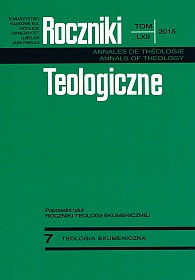Communional Marian Anthropology
Abstract
Renewal of human communion with God and among people through the Incarnation of the Son required the preparation of a woman who was to be his Mother. God chose Mary, who was outstanding in terms of religious, moral perfection and pure love, so his Son could be born in human nature without any moral blemish. Mary lasted in communion with the Holy Trinity and his Son Jesus Christ. This fact constitutes a base for communional mediation and intercession of Mary, who was also the Mother of the communion of the Church, marked also by extraordinary communional holiness. Communional Marian anthropology provides the basis for the systematic design of communional Mariology.
References
Bartnik, Czesław S. Dogmatyka katolicka. Vol. 2. Lublin: Redakcja Wydawnictw KUL, 2003.
Bartnik, Czesław S. Matka Boża. Lublin: Wydawnictwo KUL 2012.
Catechism of the Catholic Church [CCC]. 2nd Revised Edition. Geoffrey Chapman, 1999.
Jagodziński, Marek. “Recepcja soborowego paradygmatu communio w teologii systematycznej.” In Studia soborowe. Historia i recepcja Vaticanum II, edited by Michał Białkowski, 661–86. Toruń: GroupMedia, 2014.
Llewelyn, Dorian. Katolicka teologia narodowości. Translated by Aleksander Gomola. Kraków: Wydawnictwo WAM, 2014.
Müller, Gerhard Ludwig. Maria – Die Frau im Heilsplan Gottes. Regensburg: Verlag Friedrich Pustet, 2002.
Nadbrzeżny, Antoni. Od Matki Odkupienia do Matki wszystkich wierzących. Mariologia Edwarda Schillebeeckxa. Lublin: Wydawnictwo KUL, 2012.
Saszko, Irena. Rozświetlona przez Światłość Trójsłoneczną. Relacja Theotokos do Osób Trójcy Przenajświętszej w tradycji liturgicznej Kościoła prawosławnego. Lublin: Prawosławna Diecezja Lubelsko-Chełmska, 2014.
Copyright (c) 2015 Roczniki Teologiczne

This work is licensed under a Creative Commons Attribution-NonCommercial-NoDerivatives 4.0 International License.





